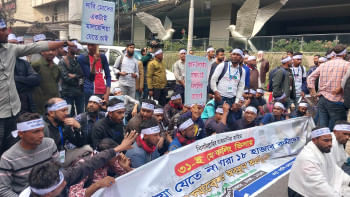FDI goes up but lower than expected

Foreign direct investment to Bangladesh rose 13 per cent year-on-year to $2.89 billion last year, in a positive development for an economy long looking to increase the flow of external funds to accelerate its growth, official figures showed.
FDI inflow has been far lower than the expected level given the country's business volume and potential of the economy.
Strict regulations, bureaucratic complexities, inadequate infrastructures and lack of one-stop service have become major challenges to lifting the volume of FDIs.
Fresh investment, or equity capital, was at a higher level last year compared to 2020, which has been described by economists as a good development for the country's investment sector.
FDI in the field of equity capital rose 35 per cent to $1.13 billion, according to data from the Bangladesh Bank.
Mustafizur Rahman, a distinguished fellow of the Centre for Policy Dialogue, said that the inflow of equity capital had not been positive for long. It finally rebounded last year.
The inflow of equity capital means that foreign companies brought in fresh funds to the country.
Two other segments of FDI are reinvested earnings and intra-company loans.
Foreign investors had earlier reinvested their earnings, generated in Bangladesh, significantly, but the trend reversed last year.
The reinvestment of earnings stood at $1.562 billion last year in contrast to $1.566 billion a year prior.
Intra-company loans increased to $194 million, up 25 per cent year-on-year.
Rahman said that the government should ensure one-stop services for foreign investors so that they felt comfortable in making the country their investment hub.
"There are a lot of positive indicators of the economy, but it has not tapped the potentiality of FDI."
Some peers of Bangladesh have managed to secure a higher volume of FDI.
For instance, Vietnam received $19.74 billion last year and $4.42 billion in the first quarter of this year.
"The country should follow the measures that Vietnam has taken," said Rahman.
Rahman said that development works of economic zones should be completed in the quickest possible time as they would attract foreign investors.
He laid emphasis on the ease of doing business by removing red tape as many investors are shying away from the country due to the bureaucratic complexities.
The government had targeted to attract $32 billion in FDI during the Seventh Five-Year Plan period stretching from the fiscal year of 2015-16 to 2019-20. But the country managed less than $10 billion.
Zahid Hussain, a former lead economist of the World Bank's Dhaka office, said the Bangladesh Bank should liberalise its foreign exchange regime further so that businesses could repatriate funds smoothly.
"The central bank should provide policy support to them in a way that helps them settle foreign transactions in Bangladesh without any hassles."
The economist called for ensuring a one-stop service as many investors were struggling to get the benefits from the initiative.
Mamun Rashid, an investment analyst, says Bangladesh has a strong wish to attract foreign investment, but there are some barriers that discourage foreign entities.
"The country's protectionism attitude is one of the major roadblocks to drawing the attention of foreign entrepreneurs."
The average protection rate, which includes different levies and taxes imposed by a government, is 27 per cent in Bangladesh.
The protection rate is 1-1.5 per cent in the developed nations, 4-4.5 per cent in the developing countries of Asia, and 9 per cent in China and India, he said.
"This means foreign businesses have to face more expenses than the local ones. We should create a level-playing field for foreign investors, or else they will not choose the country as their investment destination," Rashid said.
On top of that, the country's rules and regulations relating to the FDI are regularly described by analysts as more complex than in many other countries.
"Financial regulators such as the central bank and the National Board of Revenue should address the issues efficiently in the interest of the economy," said Rashid.


 For all latest news, follow The Daily Star's Google News channel.
For all latest news, follow The Daily Star's Google News channel. 








Comments